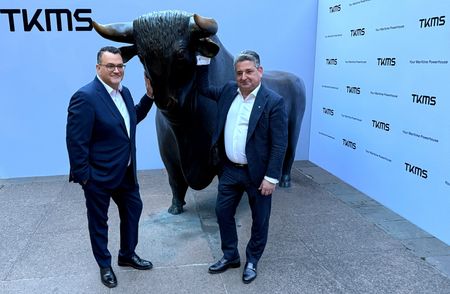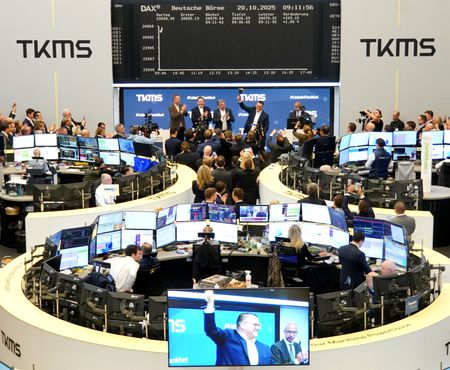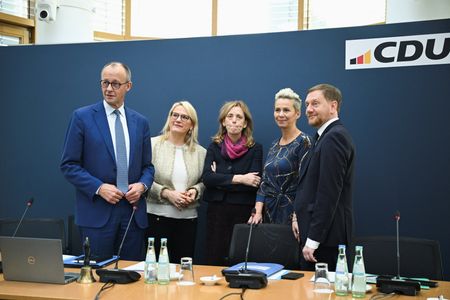By Christoph Steitz
FRANKFURT (Reuters) -Warship builder TKMS rode a global defence boom to reach a valuation of 6.3 billion euros ($7.35 billion) in its blockbuster stock market debut on Monday, surpassing that of parent and main shareholder Thyssenkrupp.
The listing of TKMS is the German conglomerate’s latest move to simplify its structure and take advantage of growing demand for defence assets.
Shares in Thyssenkrupp, which will keep a 51% stake in TKMS after the spin-off, were down 19% at 1109 GMT, reflecting the transfer of the stake in the naval vessel business, and up 8.4% once the parent’s valuation is adjusted for the transaction.
Headquartered in the northern German port city of Kiel on the Baltic Sea, TKMS, which traces its roots back 187 years, is the world’s largest builder of non-nuclear submarines and frigates. Its Atlas Electronics division also produces underwater technology, including mine-sweeping systems.
Analysts had expected the spin-off could value the company at 2.3 billion euros to 2.7 billion euros.
DEFENCE SPENDING BOUNCING BACK AFTER POST-COLD WAR LULL
Overall, Thyssenkrupp shareholders, who received one TKMS share for every 20 shares they own in the parent, saw the value of their investments jump by more than a fifth compared with Thyssenkrupp’s closing price on Friday.
Demand for defence equipment has soared as a result of Russia’s full-scale invasion of Ukraine in 2022 and subsequent U.S. pressure on Europe to bolster its military capacity.
TKMS’s order book backlog has more than tripled in the past five years, reaching 18.6 billion euros in June 2025.
“We need more flexibility … in light of rising geopolitical tensions,” TKMS CEO Oliver Burkhard said just before shares began trading.
Burkhard said he would head to Canada later on Monday alongside Defence Minister Boris Pistorius, hoping to secure a major submarine order it has recently been short-listed for.
The company is also lined up to participate in the German navy’s F127 frigate programme and negotiating a submarine contract with the Indian government.
“With defence budgets in core markets expected to more than double, TKMS is well positioned for growth,” said a note by mwb research. The group’s mid-term growth target looked understated, mwb said, given NATO and European Union procurement budgets were projected to grow by more than 170% by 2030.
The listing allows TKMS to finance acquisitions in the consolidation of Europe’s defence industry and gives it “additional degrees of freedom”, said Miguel Lopez, CEO of parent Thyssenkrupp.
In a reflection of soaring investor appetite for pure plays in the defence sector, the spin-off also coincides with deliberations by Franco-German defence supplier KNDS over an initial public offering in the coming months.
TKMS, which employs more than 9,100 staff globally, last month held its first capital markets day, presenting margin targets that some investors said were not ambitious enough when compared with rivals, such as Britain’s BAE, Germany’s NVL and France’s Naval Group.
The business that would later become TKMS began making steam engines and railroad cars in the early 1800s and later built Germany’s first submarine, the so-called Brandtaucher, as the country sought to better compete with Denmark’s navy.
Commerzbank, Citi and Deutsche Bank acted as financial advisers on Monday’s listing.
Speaking at the debut in Frankfurt, Lopez told Reuters Thyssenkrupp was in intensive discussions with India’s Jindal Steel International over the sale of the group’s steel division.
“We’ll see what outcome we’ll have over the next few months,” he said.
($1 = 0.8575 euros)
(Reporting by Christoph Steitz, Paolo Laudani, Ludwig Burger and Alexander Huebner; Writing by Christoph Steitz and Matthias Williams; Editing by Emelia Sithole-Matarise, Thomas Derpinghaus, Joe Bavier and Tomasz Janowski)













